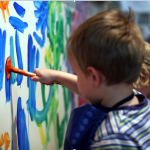Parents have a number of options when it comes to daycare and preschool and can wind up anxious and confused trying to find the “right” one. Primary care clinicians may be asked to weigh in on this important decision but themselves can be unfamiliar with the different approaches now available. To help, here is a very brief primer of some of the prevailing methodologies. 
Montessori: The Montessori approach comes from Dr. Maria Montessori: one of Italy’s first female physicians. Her initial school opened in 1907. The general approach emphasizes self-motivated learning rather than listening to teacher lessons. The curriculum includes practical life skills and sensory education in addition to language. More unique components include multi-age classrooms and “self-correcting” learning materials (that can be used one way). There may be more children per teacher than in a Reggio program to facilitate peer learning and there typically is less emphasis on imaginative or symbolic play.
Reggio: The term Reggio Emilia comes from a small town in northern Italy that was noted to have particularly excellent schools. Its worldwide appeal is more recent than other models, gaining popularity since the 1990s. The approach emphasizes relationships, community, collaboration, and self-inspired learning designed to harness a child’s inner potential. There again is less priority on teacher driven lessons. The environment is thought of as a “third teacher” and may resemble Montessori schools somewhat with more natural products and less typical plastic toys. Relatively unique components include the practice of “documentation” by teachers to help them capture interactions between teachers and children, few students per teacher (who often stay with the group of children as they age), and a strong encouragement of parental participation.
Waldorf: The Waldorf method was founded by Rudolf Steiner, an Austrian scientist in the early 1900s. It is rooted in anthroposophy which is the idea that the universe can be understood by first understanding humanity. In contrast to Montessori and Reggio, there is greater priority given to imaginative and artistic play. Activities, furthermore, tend to be more teacher driven at first rather than trying to follow the child’s lead. The environment is built to be homelike and very predictable. There is also greater attention paid to the seasons, festivals, and holidays in comparison a Reggio school.
Traditional: While a “traditional” program is more a catch-all for a large number of programs not adhering to a named school of thought, some generalizations may be appropriate. More classic “academics,” using things such as flashcards, are likely to be introduced than would be present certainly in the other types. In addition, the “thinking” or “planning” chair is likely to be more heavily utilized as a discipline technique. The environment typically includes more mainstream toy options, and the use of technology such as computers and even the occasional movie may be more present in preschools that do not follow a Reggio, Waldorf, or Montessori model.
Which approach is best? Obviously it depends on the child. There does exist some research showing that children from Montessori/Reggio/Waldorf programs do somewhat better than their peers later in school but the results are not uniform and often suffer from confounding problems (that is, other factors such as increased parental involvement that may be driving the perceived differences). One noted study published in Science, however, showed positive gains for a Montessori school in an inner-city population. In the end, something like fingerpainting, whether it is done in the context of an overarching curriculum promoting sensory-motor integration or just because it’s fun, is still fingerpainting. Common elements such as safety, warmth, enthusiasm, and structure may be critical elements of all good early educational programs, regardless of their historical background.
Lillard A, Else-Quest N. Evaluating Montessori education. Science 313:1893-1894, 2006.
Tags: montessori, parenting, reggio emilia, waldorf

